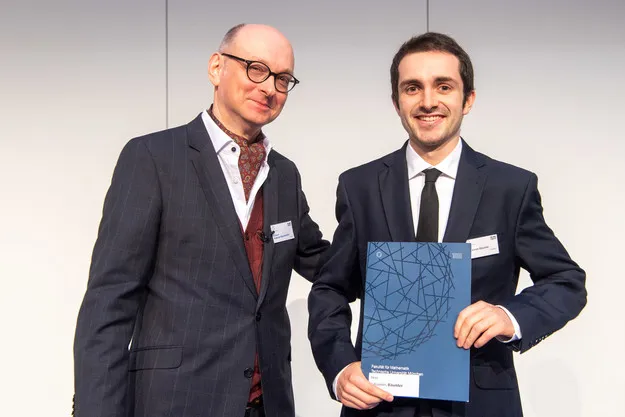The TopMath Award is a prize for PhD Students within the TopMath Program, in recognition of exceptional achievements in research. It is awarded once a year. Upon a recommendation from their mentor or the subject study advisor, the candidates are requested to apply for the award. Annually in November, the TopMath Board meets to discuss the applications and to nominate the awardee. The TopMath Award includes prize money of 500 Euros, and is usually presented within the celebratory graduation ceremony of the Department of Mathematics.
TopMath Award 2019 for Johannes Bäumler
The winner of the TopMath Award 2019 is Johannes Bäumler. He has received the award for his innovative results in the field of probability theory, which have been recognised by the international science community. In 2019 the Electronic Journal of Probability published the results of his Bachelor thesis from Autumn 2018 with the title: "Uniqueness and Non Uniqueness for Spin-Glass Ground States on Trees".
"Uniqueness and Non Uniqueness for Spin-Glass Ground States on Trees"
Text: Johannes Bäumler
In my bachelor thesis I investigated the ground states of the Edwards-Anderson (EA) spin glass model when the underlying graph is a locally finite tree. For the total number of ground states of spin glasses there were accurate results only on regular trees and an (almost) accurate result on the halfplane so far. A better understanding of the ground states of the EA spin glass models, especially for the integer lattice, is a problem with extensive consequences in mathematics and physics.
The main result of my thesis is Theorem 2.1, which states that for many distributions of the edge parameters J(e) (the couplings) the number of ground states is related to the properties of the simple random walk on the tree. More precisely, there is exactly one ground state pair if the simple random walk is recurrent and there are infinitely many ground state pairs when the simple random walk is transient. The necessary condition for the coupling distributions is that the probability that the random variable lies in a small interval centered around 0 is proportional to the length of the interval. Distributions satisfying this property are also called distributions of linear growth.
Furthermore, in section 3.1 of my thesis I give an example of a tree and a distribution of the couplings such that the number of ground states is almost surely either two or four and both events occur with probability 0.5. In particular the number of ground states is not an almost sure constant for this graph. In section 3.2 a special tree with two different distributions is examined, where one of them is not of linear growth. For this tree, the number of ground states is almost surely either two or infinity, depending on which of the coupling distribution is considered. This example shows that the linear growth condition is not just an artifact from the proof, but a necessary condition for the correctness of Theorem 2.1.
References:
[1] Ran J Tessler. Geometry and dynamics in zero temperature statistical mechanics models. arXiv preprint arXiv:1008.5279, 2010.
[2] Louis-Pierre Arguin and Michael Damron. On the number of ground states of the edwards-anderson spin glass model. In Annales de l'IHP Probabilités et statistiques, volume 50, pages 28-62, 2014.
Link to the publication: https://projecteuclid.org/euclid.ejp/1563264040
Johannes Bäumler: Vita
- 10/2015-09/2018: Bachelor Mathematics, TUM
- 10/2017-09/2018: TopMath Bachelor
- 12/2018: TopMath Study Award
- since 10/2018: TopMath Master and Doctorate
- 09/2019-02/2020: Study Abroad, ETH Zürich
- 12/2019: TopMath Award
Acknowledgement of the prize winner and his achievements
"In his Bachelor thesis, Johannes discovered an unknown and valuable connection between random waks and spin glasses. This was published in the electronic journal of probability. In his Masters thesis he works on a completely different topic, namely convergence of random processes in the rough path topology, and has already proved a fact that eluded many of the senior researchers in the field, namely quenched convergence of iterated integrals for random walks among random conductances." - Prof. Dr. Noam Berger (TUM), Mentor of Johannes Bäumler
